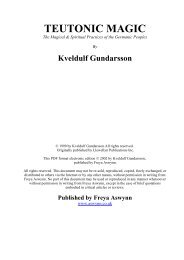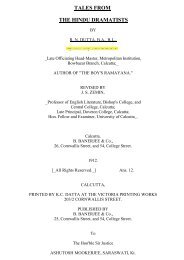Untitled - Awaken Video
Untitled - Awaken Video
Untitled - Awaken Video
Create successful ePaper yourself
Turn your PDF publications into a flip-book with our unique Google optimized e-Paper software.
Chapter 3. Midgard 68<br />
“The village was the peasants’ castle. Its raison d’etre was mutual assistance.<br />
In illness, want or danger they came to each others’ assistance.<br />
Always there was someone in the village who knew how to drive out evil with<br />
fire and steel. If a cow fell sick, it was handy to have a neighbor who knew<br />
how to cure it. Birth and marriage, death and funerals, all were the common<br />
concern of the village council. Agriculture too was carried out by the men of<br />
the village. The soil was distributed in such a way that the peasant’s plots<br />
of land might well be scattered in thirty different places. Since the fields<br />
were tilled simultaneously, the work had to be done on a basis of mutual<br />
understanding. The cattle went out, hoof by hoof, to graze together on the<br />
common land. Each villager drew his water from the village well, and at<br />
festivals all gathered on the same hillock, the ’court’ (hóf) of some god.” 12<br />
He goes on to say that since about 1000 CE, there have been solitary farms on<br />
record, but these have always been associated with a village. The ancient Germanic<br />
people have always been social, community loving people as far as can be discerned<br />
from the archeological record, and they worked together and celebrated both life<br />
and death as a community.<br />
The concept of ownership is relatively new. In the 20th century “ownership”<br />
generally means “to belong to one person,” in fact, the word “own” comes from<br />
the same root-word as “one.” To truly have a sense of ownership, one needs also<br />
to embrace the idea that one is somehow immortal: one owns something now and<br />
one will continue own on into the future. This sense of continuity, however, was<br />
somewhat foreign to the early Teutons who carried with them the idea that this life<br />
was somehow transient and that they would each pass away, leaving nothing but<br />
names and memories of good deeds performed during their short stay on Midgard.<br />
This is the meaning of the formulaic line from the Hávamál mentioned earlier,<br />
”Cattle die and kinsmen die, thyself eke soon wilt die.” 13 (Hollander, St. 76).<br />
Property was in one’s care until it was moved to another. Wealth was acquired so<br />
that it could be given away. A kenning for a king was “gold-hater” because kings were<br />
expected to give what they had acquired. And ownership of land was no exception<br />
to this rule; it was passed on to the eldest son as the successor in stewardship over<br />
the family lands which were lived upon and worked by the extended family. The<br />
ancestral lineage tied to the land was important so lands were often kept within the<br />
same family, but true ownership, in the modern sense, did not develop until long<br />
12 In A History of the Swedish People, p. 39, by Vilhelm Moberg. This is a very pleasant,<br />
easy-to-read history of the Swedish people republished as a two volume set by Dorset Press (New<br />
York) in 1989 from the original 1971 translation by Paul B. Austin.<br />
13 Hollander translation, H ávamál, St. 76.
















